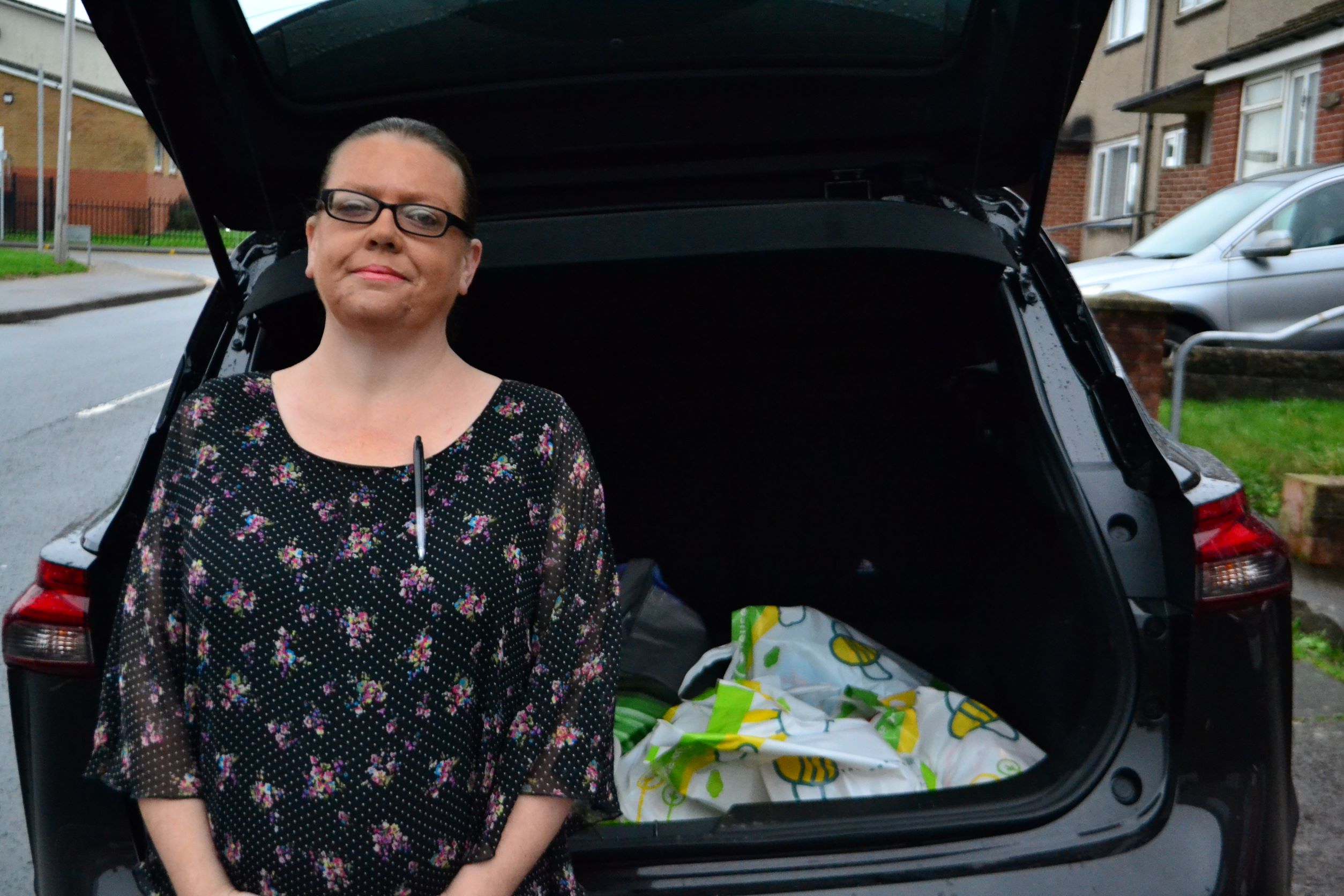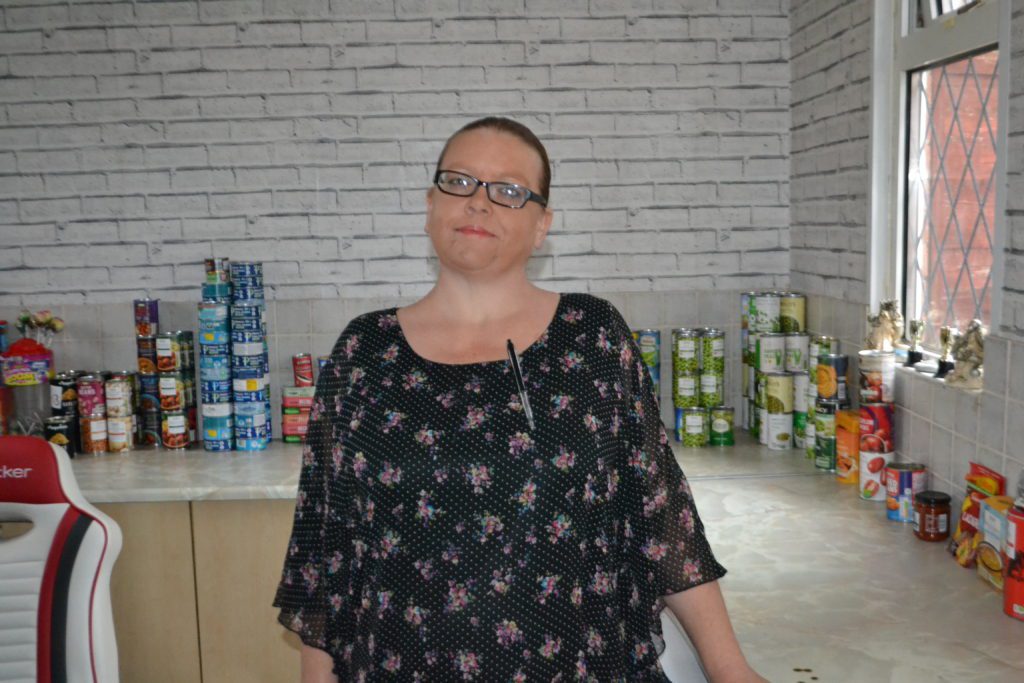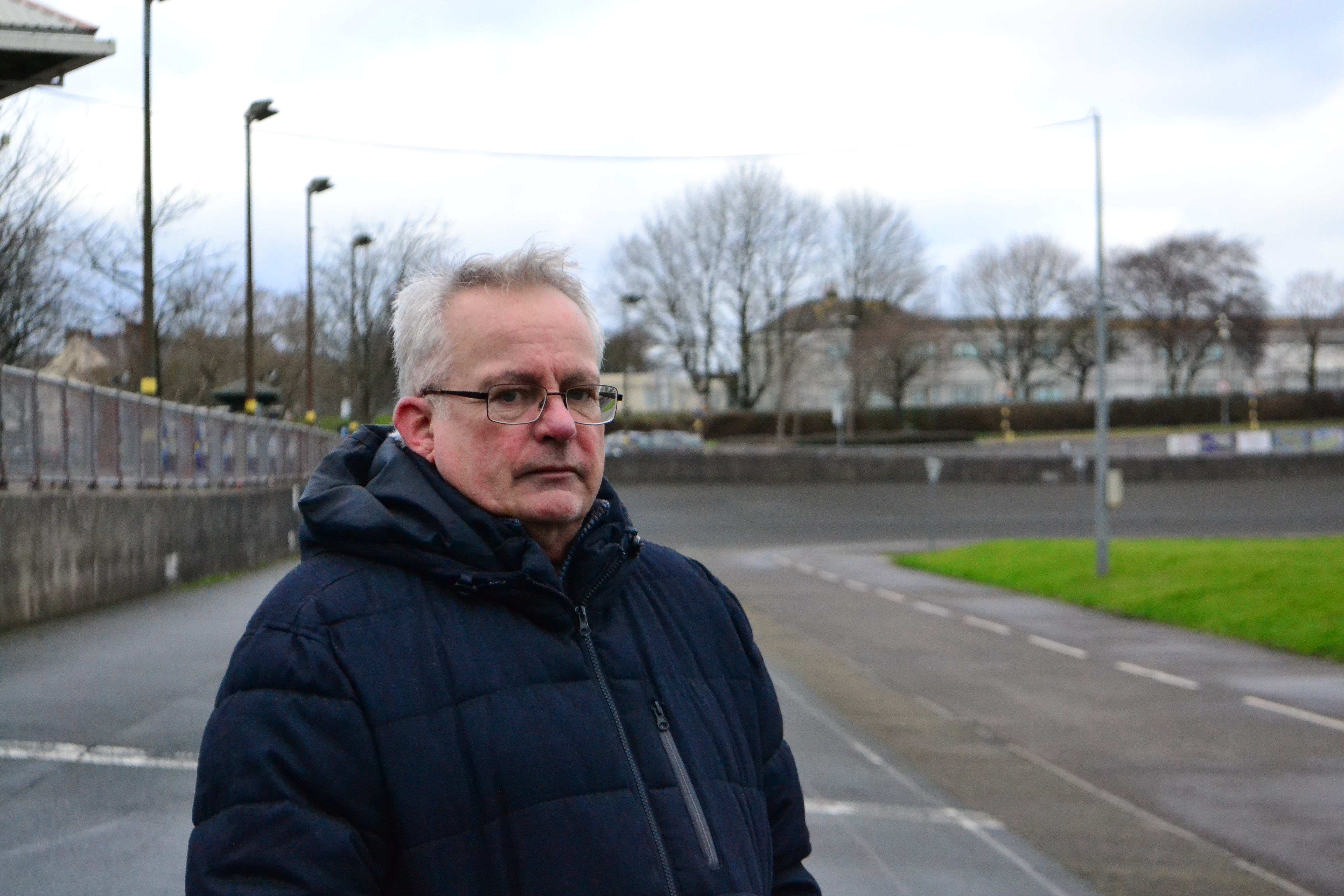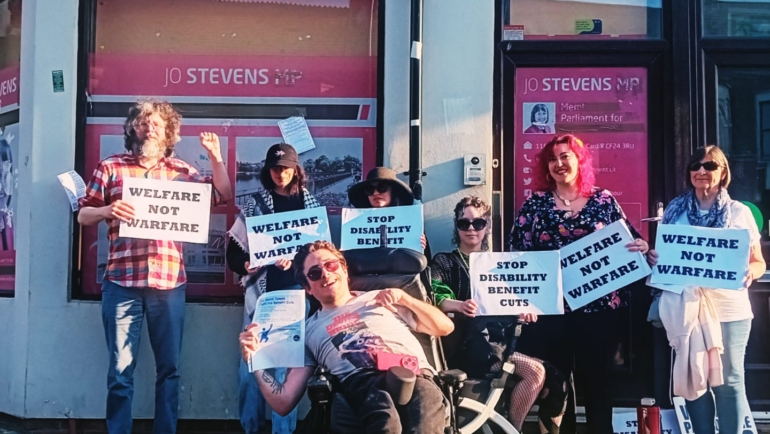
“Unheard of Levels of Poverty” – The Cost of Living Crisis Frontline
As the cost of living crisis is set to wreak havoc into the lives of the very poorest, after more than a decade of welfare cuts and stagnating wages, a woman who runs her own foodbank from her living room spoke to SC Cook about the situation on the ground.
By SC Cook. Image: Mandesa Payne, copyright voice.wales
I first came across Mandesa Payne on Facebook, completely by chance.
Always looking for a good second-hand deal, I’m a member of the group Bargain Basement Cardiff, along with 46,000 other people. But the post that popped up on the 10th January wasn’t selling something, it was a plea for help.
“If anybody could help me out please?” it asked. “I need to find a room/lockup I can use for storage? Or somewhere I can rent cheap as possible? Our foodbank is growing daily we are busier than ever before and we desperately need a bigger premises or a lockup/storage container? Any help at all would be hugely appreciated. Must be free or cheap as possible as I have no funding I’m totally self funded.[sic]”
I messaged the woman who had posted it, asking if I could speak to her about the foodbank and the situation she was seeing unfold.
“Yes no problem,” came the response. “It’s absolutely crazy at the moment I’m struggling to keep up!”
Before meeting her in person, I call Mandesa over the phone and we speak for about half an hour.
“I do everything basically I collect the food, I pack it all, I label it all, I deliver it all, all over Cardiff and Barry,” she explains.
“Off your own back, voluntarily?” I ask “Yeah.”
Other posts she sends out on Facebook advertise what she offers: “If anybody is in need of a food parcel please dm me. Same day if you’re able to collect from either Ely or llanrumney, or next day for delivery.”
The instant service offered sees Mandesa flooded with messages from people needing help. She says it’s been getting busier ever since she set up 2 years ago, but nothing compares to what 2022 has been like so far.
“This year has just been… I just don’t know what’s happened,” she says. “One night I went to bed all quiet and then I woke up and I must have had 50 odd messages, requests for food parcels. It just seemed to be like all of a sudden.”
“Over the past two weeks, I’ve done well over 150 food parcels,” she explains. “It’s a massive increase.”
“It gets busier anyway after Christmas because a lot of people get paid their benefits early, so by the time it comes round to pay again they’re pretty much skint. Last year it was busy, but this year has just been unheard of. It’s been phenomenal honestly.”
Mandesa runs her independent food bank, called Feed the Family, using all of her own resources: her own time, house, car, phone, everything. Other posts she makes ask for donations, and people deliver food and other items straight to her home.
Mandesa’s approach is based partly on her own experience from a few years back, when she had to use a foodbank herself.
“I was in a bit of a bad situation and when I did go, it was really difficult because you have to have an official person that will refer you with a food voucher that means you can get a food parcel from a registered food bank.”
When she did eventually get there, she said the level of questioning about her income and status made “me feel like I was scrounging and I was worthless, and I never ever wanted to go through it again.”
For this reason, Mandesa doesn’t screen people. If they say they need help, she gives it to them.
“People get really really embarrassed about having to ask for something in the first place you know, so if I can make that process a little bit easier, then I will.”
She admits that “there’s not really any way to police it,” but “you just gotta work on trust.”
At the bottom of one of her posts, it simply reads in block capitals: “PLEASE ONLY ASK IF YOU ARE IN GENUINE NEED OF HELP.”
The contrast to the state benefits system is profound but Mandesa knows her approach is right, because the people she meets on a daily basis are a living example of the chronic levels of poverty people are suffering from.
She recalls one woman who she recently helped, a 21 year old who had lost her job just before Christmas.
“She was sat there with no gas, no electricity, no food whatsoever, no credit on her phone to phone anyone and sort it out,” Mandesa explains.
Thankfully, the woman had a support worker who put a call into Mandesa for a food parcel.
“When I went over to drop the food off to her, she come to the door wrapped up in a blanket, she was shivering,” she explains.
“And it was New Years’ day and I was going to my sisters for New Years dinner, so I got her [my sister] to do an extra dinner, and I took her a hot dinner.”
With the cost of living crisis set to wreak further havoc into lives of the poorest, Mandesa believes this situation will get worse before it gets better.
In December, the anti-poverty research group The Bevan Foundation found that a third of families in Wales were already cutting back on their energy use, a quarter were cutting back on food for adults and 10% of families with two children were cutting back on food for children.
“As we see costs increase, and the weather gets colder so people need to use their heating more, the concern is that families are going to have to cut back even further,” said Steffan Evans from the Bevan Foundation.
In April, as the energy price cap is lifted, gas and electricity bills are set to rise by around £700 for the average household.
The RPI inflation index, what many see as the most accurate measure of price rises, is currently running at 7.1%, meaning the cost of living is soaring. But even this is undeplaying the true extent of the problem.
As the food blogger Jack Monroe has pointed out, the price of the very cheapest products, such as value rice, has gone up by a staggering 344%. Her thread highlighting the way in which official inflation statistics hide the true impact on the very poorest even prompted the Office for National Statistics rethink how they report the figures.
For Mandesa, she is seeing all this play out on the ground, and because she offers an instant service, she’s picking up some things long before they show up in official statistics.
I meet her outside the house of her brother in Llanrumney, who she has enlisted to help out. She greets me next to her car, which is already stocked with bags ready to go out for delivery.
A softly spoken woman in her forties, Mandesa tells me the seriousness of the situation she is witness to. One thing she’s noticed over the past few weeks is an alarming increase in elderly people seeking help.
As we stand out on the pavement, she gets out her phone and shows me some messages she’s recently received from people in their seventies.
“I am a pensioner and live by myself,” one reads, “is there any possibility that I can have a food parcel please.”
Another reads: “I live on my own 74 years old and housebound and I would love to have a parcel please.”
One from another elderly person who she has recently helped simply says “Thank you so much I’ve not really eaten much lately I had help off another lady but that’s running low.”
Hunger among old people was not something Mandesa had really seen before, but thinks the increase now is due to the rising cost of energy bills.
“The price of everything has gone through the roof, especially heating,” she tells me. “And people are saying they have a choice whether they heat or eat. You know, it’s absolutely terrible.”
The people who use the foodbank are “from all walks of life,” meaning they can be in work, on benefits, pensioners, young people leaving the care system or families with children. Those she helps come from various ethnic backgrounds, too.
As Mandesa explains all this she pauses for a moment and says “and do you know what…” Her tone sounds like she’s worried she’ll say something wrong, and then adds, “I find the Muslim people are the most generous for giving food donations. Honestly, they really are generous.” Maybe she feels like it needs to be said, given the Islamophobia that comes from the British press and political establishment.
Mandesa then asks if I want to come inside her brother’s house and take a look at where some of the food is stored. At first I awkwardly decline – a habit of the pandemic – but then say yes as she seems keen for me to see the operation in the flesh.
Next to her brother’s kitchen is a small, cold store room, pictured below. On the worktop sit neat rows of various things: shampoo, tins, dried goods and other essentials. From here they can be packed up in an instant. It’s useful for Mandesa to have this space, because she lives in Ely and it means there’s now a base on the east side of the city as well.

As I leave I catch her brother, who welcomes me with a big smile. He’s started doing deliveries as well and says he can’t believe how in demand they are. But what he’s also keen to point out is how grateful people are when they deliver the food, and you can tell how much this means to him.
This is the same for Mandesa, who helps not just because people are in need, but because she gets something out of it too.
“I enjoy seeing how happy people are,” she tells me outside, “and how grateful they are for the help and things, you know. I only get the gratitude of somebody saying thanks.”
Mandesa’s own house is full of food ready to be sorted and delivered. “You haven’t seen my living room, Jesus,” she says. “My kids are going nuts. I just got a pile of crates and tins of food and everything in the middle of my living room floor.”
The operation started with just herself, but she now has some help from others on odd days, but mostly from her brother and sister.
I ask if she thinks the state should be providing this kind of support, or people shouldn’t be in such poverty in the first place?
“Oh definitely, 100%,” comes her response. “Normal people who are working full time workers all their lives and still can’t afford to put food on the table, something’s going wrong you know.”
“They [foodbanks] were never heard of,” she remarks, before adding that it’s shameful that people “don’t get paid enough to live.”
When we talk about politics in general, she simply says:
“To be honest with you, I don’t like any of the politicians. I don’t agree with any of them. I think they all do a crap job to be honest with you.”
Mandesa didn’t plan to be on the frontline of the cost of living crisis, but she’s nevertheless bearing witness to it and doing whatever she can to help.
At the back of her mind is the scale of the problem, however, she’s just one small foodbank in a city of several, in a country of hundreds.
What do her kids think of what she does, I ask.
“They’re proud of me in the sense that I help so many people and they know why I do it,” she responds. “They are going mad with me because they can’t even see the TV, but they understand.”



3 Comments
Comments are closed.